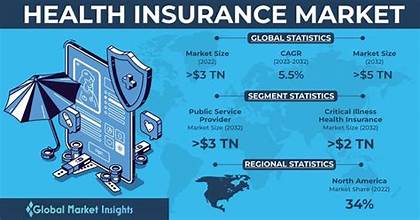The U.S. Health Insurance Market Is Undergoing A Post-pandemic Sea Change

The U.S. health insurance market is experiencing a profound transformation in the wake of the COVID-19 pandemic. This unprecedented event has not only reshaped the landscape of healthcare delivery but also significantly altered the dynamics of health insurance. As we navigate through this post-pandemic era, several key trends and changes are emerging, impacting insurers, providers, and consumers alike.
The Impact of Telehealth on Health Insurance
One of the most significant shifts has been the rapid adoption of telehealth services. During the pandemic, the need for remote medical consultations surged, prompting insurance companies to expand coverage for these services. This trend is expected to continue as both patients and providers recognize the convenience and efficiency of virtual healthcare.
Telehealth has revolutionized access to care, particularly for those in rural or underserved areas. Insurers are now incorporating telehealth as a standard benefit, and many are offering lower premiums for plans that emphasize virtual care. This change not only enhances patient convenience but also reduces overhead costs for providers, potentially leading to lower premiums for consumers.
Rise of Value-Based Care Models
Another pivotal change in the U.S. health insurance market is the shift toward value-based care models. Unlike traditional fee-for-service models, value-based care focuses on patient outcomes and cost efficiency. Insurers are increasingly collaborating with healthcare providers to implement these models, incentivizing high-quality care and better health outcomes.
Value-based care aims to reduce unnecessary procedures and hospital readmissions, which can drive down costs for both insurers and patients. By prioritizing preventive care and chronic disease management, this model promotes healthier populations and more sustainable healthcare spending.
Expansion of Medicaid and Government Programs
The pandemic highlighted the critical role of government programs like Medicaid in providing a safety net for millions of Americans. In response to the economic fallout, many states have expanded Medicaid eligibility, ensuring more individuals have access to essential health services.
The federal government has also introduced measures to make health insurance more affordable. For example, subsidies under the Affordable Care Act (ACA) have been increased, making it easier for individuals and families to purchase insurance through the marketplace. This expansion has not only increased coverage rates but also improved the overall stability of the health insurance market.
Employer-Sponsored Insurance Adaptations
Employer-sponsored insurance (ESI) remains a cornerstone of the U.S. health insurance system, but it is also evolving in response to new realities. With more people working remotely, employers are reassessing their health benefits offerings to address the unique needs of a dispersed workforce.
Many companies are now offering more flexible health plans, including options that emphasize mental health and wellness. Additionally, there is a growing trend towards high-deductible health plans (HDHPs) paired with health savings accounts (HSAs), which empower employees to take a more active role in managing their healthcare expenses.
Increased Focus on Mental Health Coverage
The pandemic has underscored the importance of mental health, leading to a surge in demand for mental health services. Insurers are responding by enhancing coverage for mental health and substance use disorder treatments. This includes expanding teletherapy options, which have become a crucial lifeline for many during periods of lockdown and social distancing.
Enhanced mental health coverage is critical not only for individual well-being but also for overall public health. By addressing mental health needs more comprehensively, insurers can help mitigate long-term healthcare costs and improve the quality of life for their members.
Technological Innovations and Health Insurance
Technological advancements are playing a crucial role in reshaping the health insurance market. From artificial intelligence (AI) to big data analytics, technology is being leveraged to enhance the efficiency and effectiveness of health insurance operations.
AI-driven algorithms are improving claims processing, fraud detection, and personalized care recommendations. Big data analytics enable insurers to identify trends and patterns in healthcare utilization, allowing for more accurate risk assessments and premium pricing. Additionally, wearable technology and health apps are empowering consumers to monitor their health proactively, potentially leading to lower healthcare costs and better outcomes.
Health Insurance and the Gig Economy
The rise of the gig economy has presented unique challenges and opportunities for the health insurance market. Gig workers, who often lack access to traditional employer-sponsored insurance, represent a growing segment of the workforce that requires flexible and affordable health insurance options.
Insurers are developing new products tailored to the needs of gig workers, such as short-term health plans and association health plans. These options provide a safety net for those who do not have consistent access to employer-sponsored benefits, ensuring they can still receive necessary medical care.
Policy Changes and Regulatory Environment
The regulatory environment surrounding health insurance continues to evolve, with significant implications for the market. The Biden administration has prioritized healthcare reform, focusing on expanding coverage and reducing costs. Key policy changes include:
- Enhancements to the ACA: Increased subsidies and extended enrollment periods aim to make health insurance more accessible.
- Surprise Billing Legislation: New laws protect consumers from unexpected out-of-network charges, promoting transparency and fairness in billing practices.
- Public Option Discussions: There is ongoing debate about the introduction of a public health insurance option, which could provide a competitive alternative to private insurance and expand coverage.
The Future of the U.S. Health Insurance Market
As the U.S. health insurance market continues to evolve post-pandemic, several trends will shape its future trajectory. Increased emphasis on telehealth, value-based care, and mental health services are likely to persist. Technological innovations will further streamline operations and enhance consumer experiences.
Moreover, the ongoing expansion of government programs and regulatory changes will continue to influence the market dynamics. Insurers will need to adapt to these changes to remain competitive and meet the evolving needs of consumers.
In conclusion, the post-pandemic era is ushering in significant changes in the U.S. health insurance market. By understanding and adapting to these trends, insurers can better serve their members and contribute to a more efficient and equitable healthcare system.